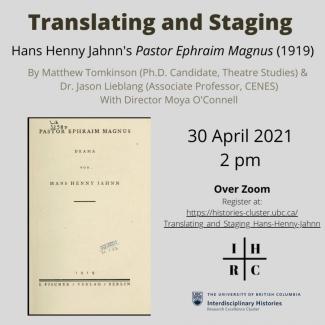Translating and Staging Hans Henny Jahnn's Pastor Ephraim Magnus (1919)
April 30, 2021, 2:00 pm to 2:00 pm
Project Leads: Matthew Tomkinson (Ph.D. Candidate, Theatre Studies) & Dr. Jason Lieblang (Associate Professor, CENES)
Director: Moya O'Connell
This translation is part of a larger project to reclaim the work of German Expressionist writer Hans Henny Jahnn by bringing it to an English-speaking public for the first time. In spite of being considered a direct precursor of Artaud’s theatre of cruelty and being admired by contemporaries including Thomas Mann, Walther Benjamin and Bertolt Brecht, Jahnn remains a peripheral figure in German-language scholarship on Expressionism. Furthermore, except for a handful of prose stories, his dramatic work remains largely unpublished in English. We are in the process of completing the first English-language translation of Jahnn’s first play, Pastor Ephraim Magnus (1919), which won the Weimar Republic’s most prestigious literary prize in 1920 (the Kleist Prize). One central justification for staging the work of “an almost unknown modernist” is, as Ritchie Robertson puts it in his “Polymorphous Eroticism in the Early Works of Hans Henny Jahnn,” “(that) his works can still give the shock of the new that has inevitably worn off in the case of canonized modernists” (105). While Jahnn’s contemporaneous audience was certainly shocked by what Robertson aptly describes as an “uncritical, even affirmative, representation of a polymorphous and transgressive eroticism mixed with violence” (105), we are interested in the untapped responses of contemporary practitioners and audience members. This translation project constitutes a new engagement with Jahnn’s work and emphasizes the author’s marginalization as a queer playwright, both in the play’s lapse into obscurity and also noting Jahnn’s exile in Norway, having fled military service. Jahnn’s work is a prime example of the nihilistic Expressionism of early twentieth-century Germany, and the play in question strongly exemplifies historical traumas (post-war existentialism), sexual traumas (sado-masochistic themes), and dramaturgical traumas (the play was cut down 80% by Brecht for his 1923 staging). Furthermore, the play’s initial reception was one of outrage and revolt. We hope to make this historical context legible for a contemporary audience by exploring innovative staging practices, including adapting the work as puppet theatre.

This event is a part of the History, From Page to Stage initiative.